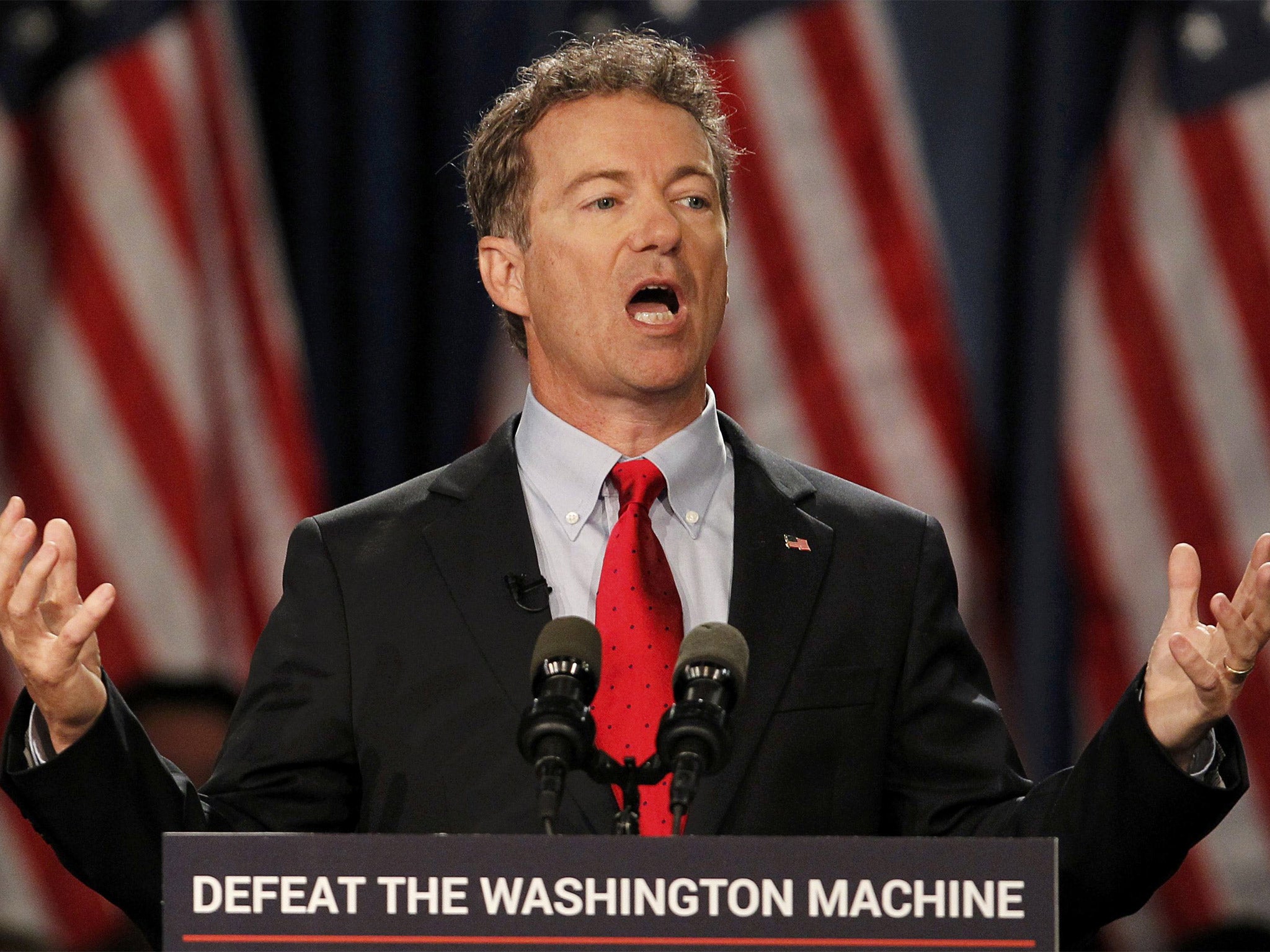Rand Paul launches presidential campaign: Republican will position himself as 'conservative with a human face'
The libertarian now faces the candidate's classic dilemma: how to remain faithful to your principles, while broadening your appeal to other sections of the party

Promising to return America “to the principles of liberty and limited government”, Kentucky senator Rand Paul launched his bid for the Republican presidential nomination, hoping to turn his trademark libertarianism into a cause uniting conservatives across the party.
The 52-year-old Mr Paul, an ophthalmologist by training, is only the second contender to formally declare. But he seems to have been running for ever. He was a podium fixture and important backstage adviser during his father Ron Paul’s two quixotic White House runs in 2008 and 2012, and managed his winning congressional campaign in Texas in 1996.
Once he was elected to the Senate in 2010, it was taken for granted that Rand would soon launch a bid of his own, using and expanding his father’s potent grass-roots organisation. For three straight years, from 2013 to 2015, he won the annual straw poll of CPAC, the Conservative Political Action Conference – no firm pointer to the future but proof of his solid conservative credentials.
CPAC, however, was the easy part. Mr Paul now faces the candidate’s classic dilemma: how to remain faithful to your principles, while broadening your appeal to other sections of the party. Or, put another way, how does he retain the enthusiasm of his father’s supporters, while differentiating himself enough to attract other conservatives who regarded the elder Paul as a quirky eccentric?
The dilemma was evident in the very choreogaphy of Rand Paul’s formal announcement, in front of a boisterous crowd in a hotel ballroom in Louisville, Kentucky. His father, 79, feted as a hero when he entered the room, was on the stage, but did not speak.
Nonetheless, his shadow looms over the son’s nascent campaign. An unabashed libertarian, a virtual isolationist who wanted the government out of public and personal matters alike, Ron Paul attracted a fanatical following of fellow believers. But despite some near misses, he never won a primary and was never a serious factor in the Republican race. No one knows that better than Rand Paul.
Strands of libertarianism remain. He urges lower taxes and spending, and excoriates the Federal Reserve (his father actually wanted to abolish the central bank). He cautiously supports legalisation of marijuana, and has bitterly criticised “illegal” blanket eavesdropping by the National Security Agency, suggesting that whistleblower Edward Snowden should be treated leniently.
But on foreign policy, his views are shifting to reflect the growing hawkishness across the Republican Party, especially after the emergence of Isis. The purist who opposed foreign interventions and nation-building by the US (and who once staged an old-fashioned 13-hour Senate filibuster against the use of drones) now proposes a $190bn boost in Pentagon spending and urges stronger action against Isis.
Simultaneously Mr Paul is positioning himself as a “conservative with a human face”. He has courted poor inner-city communities and visited black universities, and called for an end to severe mandatory prison sentences. These forays will make little difference in the primaries but could be vital in attracting centrist and independent voters in a general election
Then there is the problem of how to run as an “outsider”, an obligation these days for any presidential hopeful. Mr Paul, billing himself as “Dr Paul”, vowed to “defeat the Washington machine”. State governors seeking the nomination can credibly make that argument; less so a sitting US senator who has moved with his family to the capital.
At this very early stage in perhaps the most unpredictable Republican nominating contest in decades, polls put Mr Paul in a tightly packed second tier of declared or potential candidates, behind Jeb Bush and Wisconsin’s Governor Scott Walker. This group includes senators Ted Cruz of Texas (the first formally to enter the race) and Florida’s Marco Rubio, as well as former Arkansas governor Mike Huckabee, the retired neurosurgeon and conservative firebrand Ben Carson, and New Jersey’s Governor Chris Christie.
Mr Paul’s announcement will gain him needed publicity and should produce a bounce in both polls and grass-roots fundraising. The early primary schedule could also favour him. Among the four early-voting states, the caucus system used by Iowa and Nevada should play to the strengths of the existing Paul Network. New Hampshire, meanwhile, has long had a soft spot for iconoclast candidates. If Mr Paul, who is well liked by the Tea Party, catches fire in those states and South Carolina, then who knows?
Subscribe to Independent Premium to bookmark this article
Want to bookmark your favourite articles and stories to read or reference later? Start your Independent Premium subscription today.

Join our commenting forum
Join thought-provoking conversations, follow other Independent readers and see their replies